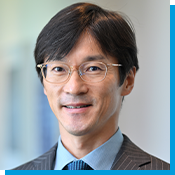Capital IdeasTM
Investment insights from Capital Group
Japan
Economic intricacies and structural challenges are commonplace in Japan. But looking through the lens of individual companies shines a different light on the nation.
In this paper, newly named portfolio managers of Capital Group Japan Equity strategy, Kohei Higashi and Harry Gunji, discuss how they are navigating turbulent times and outline where they see opportunities in Asia’s largest economy.
Macro uncertainties, the US Federal Reserve’s (Fed) tightening and a weak yen have caused jitters in Japan’s financial markets. What’s your outlook for the Japanese economy in view of these concerns?
Kohei: The interest rate gap between the US and Japan is a major cause of yen weakness. I believe the Fed will continue on its path of interest rate hikes to fight inflation. But playing the role of a proactive inflation firefighter has its downside as over-tightening can hurt consumers in the US, especially those from middle- and low-income households.
The Bank of Japan (BOJ) recognises this and has ruled out using aggressive rate hikes, while committing to keep the yen weakness in check. As the BOJ is unlikely to veer away from its current monetary policy stance, at least in the near term, the yen could remain under pressure. For some domestic-oriented companies, a weak yen is a risk. But for exporters, it is a tailwind.
The yen’s weakness also has an inflationary impact on Japan’s economy given the country’s position as a big net importer of energy, food and soft commodities. Inflation has been hovering above the central bank’s 2% target for a few months now. It is not unprecedented for it to rise to higher levels, as experienced in the 1970s.
The reopening of borders and businesses, pent-up consumer demand, and savings accumulated during the pandemic, are all providing support for Japan’s economy and other parts of the world. It remains to be seen whether the current consumption level can be sustained globally. I expect it to last through the rest of the year before tapering off in 2023.
The BOJ is out of step with other major central banks
Having a plan for interest rates and the credibility to impose it on markets is of paramount importance to the central bank
Implied change in policy rate in one year (%)
.png)
As at 30 June 2022. US: federal funds target rate midpoint of range; Eurozone: European Central Bank deposit facility; Japan: Mutan overnight average call rate; UK: Bank of England official bank rate. Sources: Capital Group, Bloomberg
Harry: We’re at a potential turning point in macro cycles and geopolitical dynamics. Not just Japan, but the world is facing a long list of uncertainties, with the main ones stemming from geopolitical tensions, supply chain disruptions, rising interest and inflation rates, and the ongoing pandemic.
Much attention is given to the US and how the workings of its economy will affect the world. But it is important to acknowledge the differences between the US and Japan as these economies are structurally different and face different issues.
In the US, although inflation is at a multi-decade high, its labour costs are also rising as wage growth continues to be boosted by a tight jobs market. The US dollar has also been strong following this year’s aggressive rate hikes.
Our latest insights
Past results are not predictive of results in future periods. It is not possible to invest directly in an index, which is unmanaged. The value of investments and income from them can go down as well as up and you may lose some or all of your initial investment. This information is not intended to provide investment, tax or other advice, or to be a solicitation to buy or sell any securities.
Statements attributed to an individual represent the opinions of that individual as of the date published and do not necessarily reflect the opinions of Capital Group or its affiliates. All information is as at the date indicated unless otherwise stated. Some information may have been obtained from third parties, and as such the reliability of that information is not guaranteed.
Capital Group manages equity assets through three investment groups. These groups make investment and proxy voting decisions independently. Fixed income investment professionals provide fixed income research and investment management across the Capital organization; however, for securities with equity characteristics, they act solely on behalf of one of the three equity investment groups.
 Kohei Higashi
Kohei Higashi
 Harry Gunji
Harry Gunji